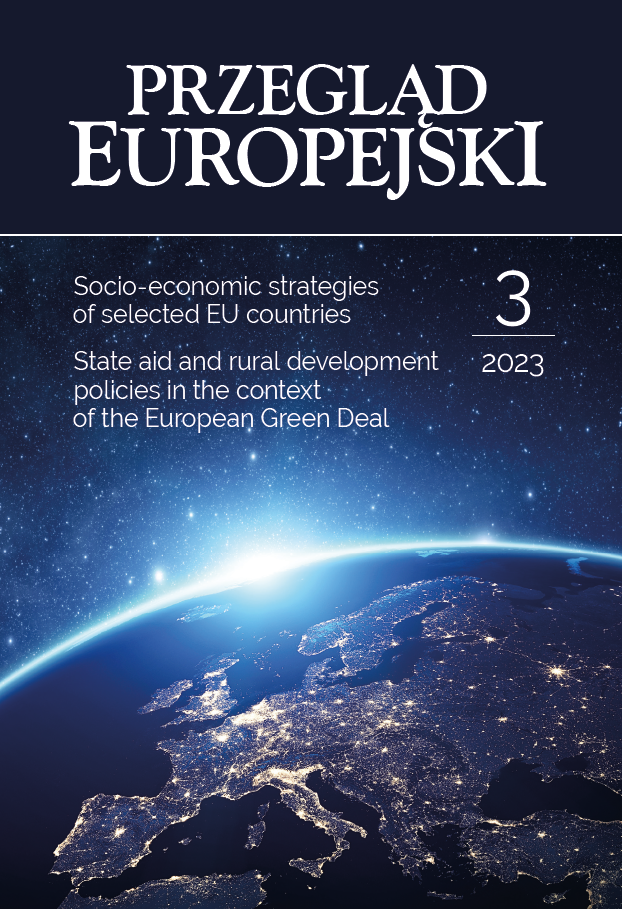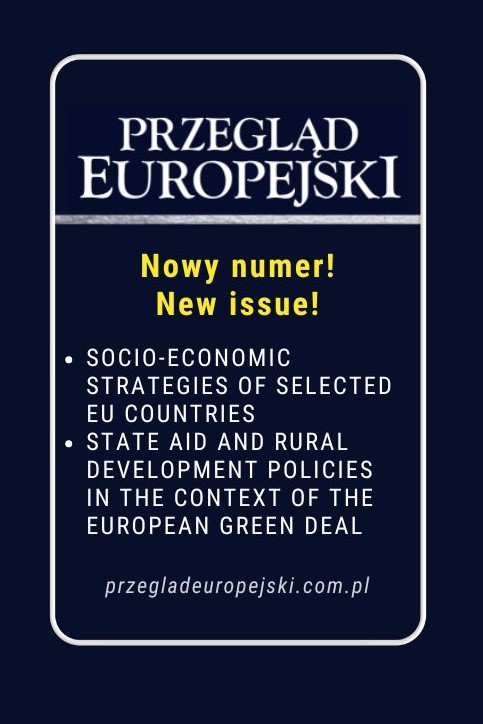Numer 2023/3
Strategie społeczno-gospodarcze wybranych państw UE; Polityki pomocy publicznej i rozwoju obszarów wiejskich w kontekście Europejskiego Zielonego Ładu|
Spis treści
Strony
Pobierz
|
|||||
|
Adam Oleksiuk
Socio-economic strategies on the example of selected EU countries – cognitive theory and application approach
DOI: https://doi.org/10.31338/1641-2478pe.3.23.1
9 – 24
|
|||||
|
Słowa kluczowe European Union |development |socio-economic strategies |EU countriesStreszczenie The article’s aim is to explain the essence and specificity of the creation of socio-economic strategies on the example of key documents of development character in selected EU countries. The author discusses the definitional issues related to socio-economic strategies, the motives for their creation, the institutions preparing them, typologies of strategies and methods of their development, as well as the overarching goals formulated in these documents. A separate part of the research is devoted to selected issues that are presented in key strategic documents of the European countries. In the article, examples of solutions implemented in the leading socio-economic strategies of the selected EU countries such as Lithuania, Latvia, Estonia, the Czech Republic, Poland, and Croatia are woven into theoretical considerations. Primary sources in the form of strategic documents and available scientific literature were used for the analysis. The article allows, on the one hand, to better prepare for the initiation of the entire process of drawing up socio-economic strategies and, on the other hand, to familiarise readers with the development directions of individual European countries. |
|||||
|
Beata Kosowska-Gąstoł
Institutionalisation of European political parties. Niedermayer’s model revisited
DOI: https://doi.org/10.31338/1641-2478pe.3.23.2
27 – 44
|
|||||
|
Słowa kluczowe Europarties |party structures |institutionalisation |EPP |PES |European ParliamentStreszczenie According to Niedermayer’s concept of Europarties’ development (1983), these organisations have to go through three phases (contact, cooperation, integration) to be fully institutionalised. The aim of this article is to analyse relationships between Europarties and their member parties on the basis of statutes of the former in order to answer the question of where individual Europarties should currently be placed in the Niedermayer’s model. The subjects of the analysis are all entities existing in the 9th European Parliament term of office (2019–2024): EPP, PES, ALDE, EGP, ECR, ID, PEL, EFA, EDP, ECPM. The analysis demonstrates that some Europarties tend to create supranational structure (e.g. EPP), others settle for transnational cooperation (e.g. PES). Therefore, we can ask whether completing the integration phase is the only way to institutionalise the Europarty. |
|||||
|
Małgorzata Michalewska-Pawlak
Evolution of the European Union’s policy for development of rural communities in the context of the European Green Deal strategy implementation
DOI: https://doi.org/10.31338/1641-2478pe.3.23.3
45 – 58
|
|||||
|
Słowa kluczowe European Union (EU) |rural communities |endogenous potential |rural policy |European Green DealStreszczenie This article refers to development support instruments for rural communities in the European Union (EU). The author presents the systemic and strategic determinants of creation and delivery of the EU rural community policy, as well as the origins and evolution of the Union policy in the abovementioned scope. The analysis is focused on the specific institutional and financial solutions which promote sustainable development of rural communities. The article demonstrates that multi-level and multi-agent nature of the development management system in the EU affects the implementation of a neo-endogenous policy towards rural communities in the EU. The text also presents developments in the implementation of EU policy for rural communities after 2021 in the context of the implementation of the European Green Deal (EGD) strategy. |
|||||
|
Piotr Gabryjończyk,
Jan Zawadka, Krystyna Krzyżanowska Educational activity of farms in selected European countries
DOI: https://doi.org/10.31338/1641-2478pe.3.23.4
61 – 77
|
|||||
|
Słowa kluczowe educational farms |didactic farms |educational functions of farms |European countriesStreszczenie The aim of the article is to present the genesis and idea of the activity of educational farms, as well as their organisation and functioning in selected European countries (Poland, Italy, Switzerland, Austria, France). The desk research method was used in this study. Educational farms in different countries are connected by the area of their operation and the goals pursued. However, significant differences can be found in the official requirements for such entities, as well as in the ways and possibilities of cooperation between them within the organisations associating them, which results in significant heterogeneity of educational farms in individual countries. The presented research outcomes may be helpful in improving existing and creating new entities associating educational farms. INFORMACJE O AUTORACH Piotr Gabryjończyk Szkoła Główna Gospodarstwa Wiejskiego w Warszawie Krystyna Krzyżanowska Szkoła Główna Gospodarstwa Wiejskiego w Warszawie |
|||||
|
Beata Glinkowska-Krauze,
Viacheslav Chebotarov, Iegor Chebotarov National business cultures of Poland, Lithuania and Ukraine as a factor of the synthesis of Western and Eastern management styles
DOI: https://doi.org/10.31338/1641-2478pe.3.23.5
79 – 93
|
|||||
|
Słowa kluczowe Poland |Ukraine |Lithuania |national business cultures |management in Eastern EuropeStreszczenie In this study, based on the identification of similarity factors of the national business cultures of Poland, Lithuania and Ukraine, the hypothesis was formulated and verified concerning the formation of premises for a new management style – Eastern European management as a synthesis of Western and Eastern management. Using the measurement tools of modern economic comparative analysis, an analysis of the business cultures of these countries was conducted. The feature system was built by comparing western and eastern conceptual management approaches and practices. It has been proven that the great proximity (similarity) of the national business cultures of Poland, Lithuania and Ukraine creates conditions for optimal combination of the advantages of Western and Eastern management. INFORMACJE O AUTORACH |
|||||
|
Adam A. Ambroziak,
Beata Grzegorzewska State aid policy for environmental protection in Poland after accession to the European Union: did it meet expectations in the face of challenges?
DOI: https://doi.org/10.31338/1641-2478pe.3.23.6
95 – 109
|
|||||
|
Słowa kluczowe Poland |European Union |state aid for environmental protection |“polluter pays” principleStreszczenie In the face of years of negligence in the environmental protection in Poland, the membership in the European Union has caused the adoption not only of a restrictive legal framework and now ambitious environmental goals, but also restrictions on permissible support for entrepreneurs. To date there is a lack of research combining both legal and financial aspects in this field. The aim of this study is to identify the extent, to which Poland’s policy of financial assistance to entrepreneurs has exercised the legal framework for granting state aid for environmental protection. To this end, we conducted a comparative analysis of EU legislation on state aid and Polish aid schemes for environmental protection, as well as statistical analysis of changes in granting aforementioned state aid in terms of its intended uses and areas of support in Poland. We found the high degree of cumulation to certain sectors and incidentality of environmental aid in Poland, both in terms of its objectives envisaged by the Commission and of support areas. That support did not follow a well-thought-out, coherent and systematic policy of supporting entrepreneurs, but was merely a collection of isolated interventions, depending on the availability of fund resources in the EU financial perspectives. INFORMACJE O AUTORACH |
|||||
|
Piotr Trąpczyński,
Barbara Jankowska, Łukasz Puślecki, Zuzanna Maleszewska, Melanie Franke, Thomas Steger Polish subsidiaries in Germany – post-transition country firms' legitimation strategies
DOI: https://doi.org/10.31338/1641-2478pe.3.23.7
111 – 129
|
|||||
|
Słowa kluczowe legitimacy |international business |emerging markets |post-transition economies |foreign subsidiaries |Polish FDI |GermanyStreszczenie Legitimacy in foreign markets, a concept rooted in institutional theory, has traditionally been examined for firms originating from advanced economies. However, it becomes more complex for firms from emerging and post-transition economies. Polish firms began establishing foreign subsidiaries after the accession to the EU, primarily in European markets. In this context, Germany was a key destination for Polish foreign direct investment (FDI). However, scholarly literature about foreign subsidiaries established or acquired by Polish firms is limited. This article presents the analysis of the legitimation strategies employed by post-transition country firms in advanced economies, using Polish subsidiaries in Germany as empirical cases. The empirical context is chosen due to its economic significance and the close linkages between Poland and Germany. With a conceptual framework, the authors synthesise legitimation strategies discussed in scholar literature and highlight some unique challenges for post-transition economy’s firms. The article presents outcomes from a qualitative study, extending the framework and offering some fresh perspectives in the field of international business legitimacy. INFORMACJE O AUTORACH |
|||||
|
Joanna Bednarz
Book review: A.A. Ambroziak (ed.), Poland in the European Union. Report 2023, SGH Publishing House, Warsaw 2023
DOI: https://doi.org/10.31338/1641-2478pe.3.23.8
133 – 137
|
|||||
|
Streszczenie The monograph entitled "Poland in the European Union. Report 2023" is a collectively written study prepared by researchers of the Department of European Integration and Legal Studies, Collegium of World Economy, SGH Warsaw School of Economics, under the scientific editorship of Adam A. Ambroziak. This is the third edition of the cyclical report, in which the authors continue the discussion about economic and legal problems and the future of Poland in the European Union. This year the report is devoted to the important macro- and mesoeconomic (sectoral and regional) problems related to Poland’s presence in the European Union (EU), as well as the integration within the EU itself. Significant advantage of this book is the discussion on current topics such as the situation in Ukraine, immigration to Poland, carbon dioxide (CO2) emissions, and public aid in Poland, including the COVID-19 pandemic. The book consists of 8 chapters. It is preceded by the Introduction, in which the authors present the purpose, concept, thematic scope, and content of each part. |
|||||
|
Jane Riccarda Weber
The perspective for the research of local transport problems in the EU Member States
DOI: https://doi.org/10.31338/1641-2478pe.3.23.9
139 – 142
|
|||||
|
Streszczenie The constant evolution of public transportation in European Union Member States requires a deep understanding of the needs, preferences and dynamics of the carpool. In this context, the analysis of the transport market is becoming increasingly important. Such surveys not only reflect the pulse of current mobility developments, but also provide insights into the interactions between innovation usage, customer satisfaction and pricing in public transportation. In the course of such study, qualitative and quantitative research methods can be combined in order to draw a comprehensive picture of market realities. The analysis follows the economic principle of supply and demand and aims not only to address current challenges, but also to develop future-oriented strategies for efficient and customer-oriented local public transport. The author proposes in this research note the persprctive for studying local transport problems in the EU Member States. INFORMACJE O AUTORZE
Ekonomická univerzita v Bratislave, Słowacja
|
|||||


